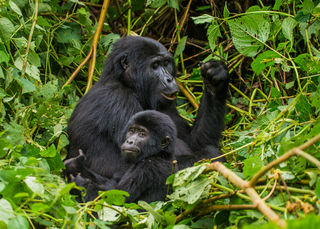Putting Our Heads Together
Psychologist Michael Tomasello traces the evolutionary roots of humans' unique cognitive skills.
By Abigail Fagan published January 2, 2019 - last reviewed on September 29, 2022

Michael Tomasello has long puzzled over what makes our species special. In his book, Becoming Human, the psychologist draws from his studies of young children and great apes to trace the pathways along which humans diverge from their primate relatives—identifying the differences that have enabled us to flourish.
What do we learn about humans by studying apes?
If great apes do something that we also do, then that behavior has deep evolutionary roots in humans. Therefore, it can't be due to language, because apes don't have languages. It's not due to culture, because they don't have a human-like culture. And it's not due to the kind of teaching that human children receive. I look at that baseline and ask how uniquely human qualities manifest.
What's an early example of how children show a uniquely human capacity?
When great apes communicate or gesture with one another, they are regulating face-to-face interactions, like grooming, fighting, or playing. That's the baseline—intentionally trying to influence behavior by posturing and gesturing to each other. But human children, at around a year old, start doing something different. They start pointing to things, trying to get the other person to pay attention. The apes have a direct line to one another, but we have a triangle—a meeting of the minds about some third thing. That's the first step away from apes.
How might such basic abilities have led to a lofty human characteristic like morality?
When we collaborate, we're interdependent. Let's say you and I are going to hunt an antelope together, and we need both of us to be successful. If you fall in a pit, it's in my interest to help you out, so I do. Likewise, when we kill the antelope, you could chase me away and eat it all. That would be fine for you tonight, but then I'm never going to cooperate with you again and you're not going to have any other collaborators. We have a choice of partners, and anybody who's not a good cooperator gets selected against.
Simply put, why are humans unique?
It's not just that we are smarter than chimps: We've got a new thing going, and that is the ability to leverage everybody else's intelligence. We have found a way to put our heads together to collaborate, communicate, learn from one another, and form cultural groups in which we construct things like languages and numerals that we pass on to our children.
Has your work enriched the experience of raising your own children?
One of my children is 7 years old, and my wife and I have been amazed by the way kids tune into other people. Whenever they're doing something, they want you to watch. If you're not watching, it's like it never happened. From pointing to interesting things to telling you what occurred at school, children have a motivation to share. Humans live a life of sharing information and emotions, and that's what children are learning to do.
Facebook/LinkedIn image: GaudiLab/Shutterstock
